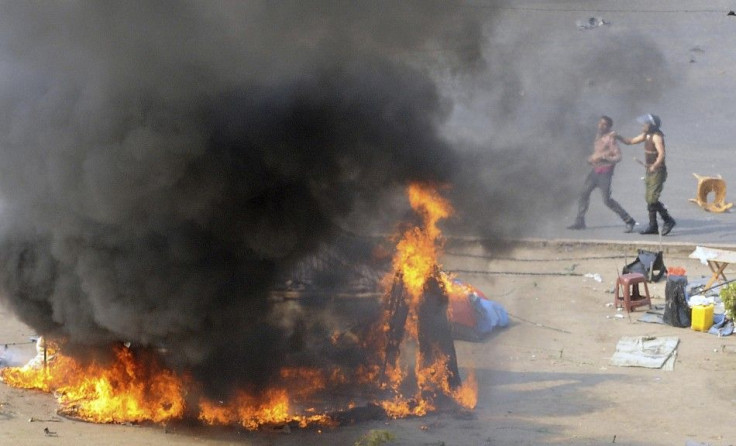Violence Rages in Tahrir Square for 5th Day

(Reuters) - Egyptian police and soldiers fired weapons and used batons and teargas for a fifth day Tuesday in the latest effort to clear Cairo's central Tahrir Square of opponents of army rule, amid mounting international concern about the violence.
Secretary of State Hillary Clinton condemned as shocking incidents such as one in which two Egyptian soldiers were filmed dragging a woman protester on the ground by her shirt, exposing her underwear, then clubbing and kicking her.
This systematic degradation of Egyptian women dishonors the revolution, disgraces the state and its uniform and is not worthy of a great people, Clinton was quoted as saying in a speech at Washington's Georgetown University.
Gen. Adel Emara, a member of the Supreme Council of the Armed Forces that took over after President Hosni Mubarak was overthrown in February, said Monday the attack on the woman protester was an isolated incident that was under investigation.
The United States, which saw Egypt as a staunch ally in the Mubarak era, gives Cairo $1.3 billion a year in military aid.
Gunfire rang out across Tahrir Square at dawn as security forces charged hundreds of protesters attempting to hold their ground, activists and a Reuters journalist at the scene said.
After a night of clashes, hundreds of people were in Tahrir in the morning, although traffic was still flowing through.
Medical sources say 13 people have been killed and hundreds wounded in the violence that began on Friday in Tahrir and nearby streets leading to Parliament and the Cabinet office.
Army generals and their advisers have condemned the pro-democracy protesters, sometimes in extraordinarily harsh terms.
HITLER'S INCINERATORS
What is your feeling when you see Egypt and its history burn in front of you? retired general Abdel Moneim Kato, an army adviser, told al-Shorouk daily, referring a government archive building set alight during clashes. Yet you worry about a vagrant who should be burnt in Hitler's incinerators.
Emara said evil forces wanted to sow chaos and soldiers had shown self-restraint despite provocation.
What is happening does not belong with the revolution and its pure youth, who never wanted to bring down this nation, he said. Despite the actions of the security forces in Tahrir, Emara denied that the army had given orders to clear the square.
U.N. Secretary-General Ban Ki-moon has criticized the use of excessive force by the Egyptian authorities. Rights groups said suppliers should not send small arms to Egypt.
The flare-up has also marred a staggered parliamentary election that began on Nov. 28 and ends Jan. 11, but the army has said a promised transition to civilian rule will go ahead.
Results so far suggest the once-banned Muslim Brotherhood and other Islamist parties will dominate the lower house.
Before the latest charge by the security forces in Tahrir, protesters had been trying to tear down a brick wall the army had put up to block access to Parliament, located nearby.
Hundreds of state security forces and the army entered the square and began firing heavily. They chased protesters and burned anything in their way, including medical supplies and blankets, said a protester who gave his name only as Ismail.
Some of those who fell had gunshot wounds to the legs, he added, speaking by telephone from Tahrir.
Politicians and members of Parliament who had been staging a sit-in nearby tried to enter the square but were forced to turn back as the gunfire and clashes raged on, Ismail said.
The violent crackdown has alarmed rights group. Amnesty International urged arms suppliers to stop sending small arms and ammunition to Egypt's military and security forces.
Reporters Without Borders said the army's systematic use of violence against media personnel, was blocking access to information in and around the square.
Many Egyptians want to focus on building democratic institutions, not street activism, but have nevertheless been shocked by the tactics of security forces in and around Tahrir.
The latest violence broke out just after the second stage of a six-week election for Egypt's new parliament that starts a slow countdown to the army's return to barracks. The military has pledged to hand power to an elected president by July.
Hard-core activists have camped in Tahrir since a protest against army rule on Nov. 18, which was sparked by the army-backed cabinet's proposals to permanently shield the military from civilian oversight in the new constitution.
(Additional reporting by Shaimaa Fayed and Dina Zayed; Writing by Edmund Blair; Editing by Alistair Lyon)
© Copyright Thomson Reuters 2024. All rights reserved.





















